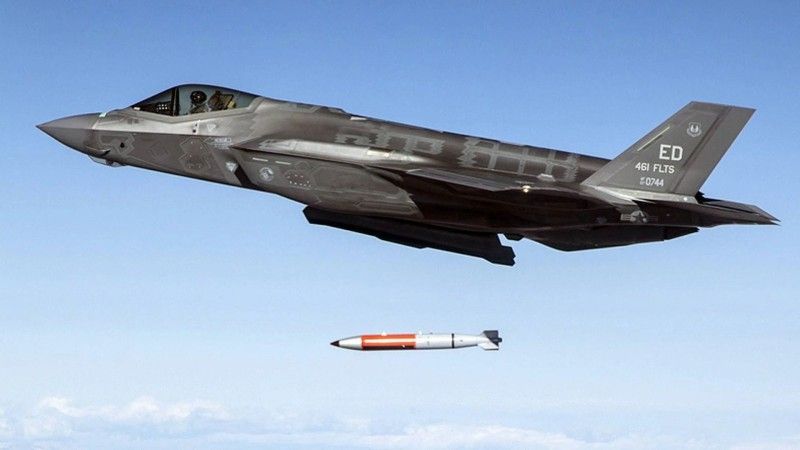Defence Policy
Polish F-35 Jets To Be Nuclear Capable? Polish National Security Bureau Takes the Floor

Photo. DOD F-35 Joint Program Office
Jacek Siewiera, head of the Polish National Security Bureau stated that the inclusion of Poland in the Nuclear Sharing programme does not necessarily translate into the deployment of nuclear warheads to Poland. Siewiera maintains that it is far more important to make the Polish F-35 fighter aircraft nuclear capable though.
Just before the NATO summit in Vilnius, the head of the Polish National Security Bureau presented an interesting stance regarding the Polish Nuclear Sharing participation. Let us recall: NATO Nuclear Sharing is a system in which selected NATO member states (Germany, Italy, Belgium, the Netherlands, and probably Turkey) are hosting the US B61 nuclear bomb units that can be carried by US and allied aircraft (F-16, Tornado, USAF F-15E, and, finally, the F-35A).
The bombs are stored in special bunkers and remain under US jurisdiction. In the event of a war, they may be shared by the United States. The bombs as such are currently being modified to the B61-12 variant, which enhances their range and accuracy, and allows the F-35 to carry them.
As of 2022, Poland and its authorities have been expressing their interest in joining the Nuclear Sharing programme. The above is tied to the deployment of Russian nuclear weapons in Belarus. Last year the representatives of the US government maintained that no talks are underway, regarding the deployment of nuclear weapons to Poland.
BREAKING: Head of the Polish National Security Bureau @BBN_PL reiterates Polish position regarding #NuclearSharing. Integration of B61 w/Polish #F35 more important than stationing nukes here. #Poland is open to options that do not include stationing B61 in Poland, but do include… https://t.co/68nZFBOnuC
— Jakub Palowski (@JakubPalowski) July 10, 2023
The head of the Polish National Security Bureau stated that the inclusion of Poland in the Nuclear Sharing scheme does not necessarily need to translate into the deployment of the B61-12 bombs to Poland. He added that making the Polish F-35s nuclear-capable and training the pilots is far more important, just as the inclusion of the Polish officers in the planning of the nuclear doctrine is. This may be an attempt made to meet the Allied stance - with the Allies unwilling to deploy the nuclear weapons to Poland. A similar stance was presented by the Head of the National Security Bureau in an interview for the DPA Agency, between March and April 2023.
Notably, the 1997 NATO-Russia Founding Act includes a unilateral commitment NATO made, on the lack of intention, plans, or reason to deploy nuclear weapons and establish nuclear weapons storage infrastructure in the newly admitted member states. This commitment, contrary to another, regarding the not-deploying of conventional forces, has no conditional profile. For the conventional NATO forces, a reservation is made that the alliance would not relocate its assets in the current, foreseeable security environment.
Scenario 3 is a substantial expansion of deterrence posture with new countries in #NuclearSharing (like Poland, perhaps Norway?). Just noting that NATO-Russia Founding Act has provisions on no nukes in new Member States, but also all Russian nukes in Russia. May be difficult 4/ pic.twitter.com/B8KsKGIOIr
— Jakub Palowski (@JakubPalowski) March 29, 2023
Let us add that the NATO-Russia Founding Act foreword also includes information that Moscow has withdrawn all of its nuclear weapons back to its territory. This is no longer true after some Russian nuclear weapons have been deployed to Belarus. Despite the above, the allies are reluctant to engage in a response deployment, worried about potential escalation.
The stance adopted by the head of the Polish National Security Bureau somewhat addresses those worries and is also aimed at bolstering the Polish deterrence potential. The Polish officers have already been involved in the NATO nuclear planning to some extent (as those processes see the involvement of all allies). Since 2014 (Russian annexation of Crimea), Poland has also been a part of exercises organized to train nuclear deterrence - as the Polish F-16s take part in them in the SNOWCAT role (Support of Nuclear Operations With Conventional Air Tactics).
Integration of the nuclear weapons on the Polish F-35s would hence be yet another step in reinforcing the nuclear deterrence system, as NATO is facing the aggressive Russian policy. The potential employment of fighter aircraft armed with the B61 bombs would require close collaboration with the USA, and other European NATO member states, who host the nuclear weapons storage facilities. Despite that, Poland's role in the deterrence scheme would be much more significant. That could be viewed as an adequate response to the Russian escalation, and the growing importance of nuclear weapons, voiced by Russia and Belarus - and such voices had been present in the public sphere long before Moscow launched a full-scale aggression against Ukraine in 2022.
